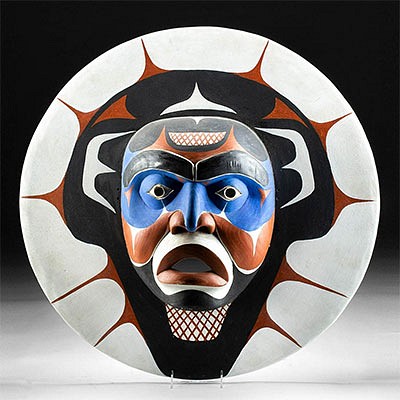Lot of 2, Teotihuacan & Mezcala Stone Axe Gods
Lot 38b
About Seller
Artemis Fine Arts
686 S Taylor Ave, Ste 106
Louisville, CO 80027
United States
Selling antiquities, ancient and ethnographic art online since 1993, Artemis Gallery specializes in Classical Antiquities (Egyptian, Greek, Roman, Near Eastern), Asian, Pre-Columbian, African / Tribal / Oceanographic art. Our extensive inventory includes pottery, stone, metal, wood, glass and textil...Read more
Estimate:
$700 - $1,000
Absentee vs Live bid
Two ways to bid:
- Leave a max absentee bid and the platform will bid on your behalf up to your maximum bid during the live auction.
- Bid live during the auction and your bids will be submitted real-time to the auctioneer.
Bid Increments
| Price | Bid Increment |
|---|---|
| $0 | $25 |
| $300 | $50 |
| $1,000 | $100 |
| $2,000 | $250 |
| $5,000 | $500 |
| $10,000 | $1,000 |
| $20,000 | $2,500 |
| $50,000 | $5,000 |
| $100,000 | $10,000 |
| $200,000 | $20,000 |
About Auction
By Artemis Fine Arts
Mar 18, 2021
Set Reminder
2021-03-18 10:00:00
2021-03-18 10:00:00
America/New_York
Bidsquare
Bidsquare : Pre-Columbian | Tribal | Oceanic
https://www.bidsquare.com/auctions/artemis-gallery/pre-columbian-tribal-oceanic-6520
Featuring Pre-Columbian, Native American, African / Tribal, Oceanic, much more. All items have been legally acquired and are legal to sell. Convenient in-house shipping. Artemis Fine Arts info@artemisgallery.com
Featuring Pre-Columbian, Native American, African / Tribal, Oceanic, much more. All items have been legally acquired and are legal to sell. Convenient in-house shipping. Artemis Fine Arts info@artemisgallery.com
- Lot Description
Pre-Columbian, Mexico, Guerrero region, Mezcala, ca. 500 to 100 BCE; Valley of Mexico, Teotihuacan, ca. 200 to 800 CE. A fine pair of hand-carved and string cut stone anthropomorphic figures of abstract forms. The largest is carved from a gray stone and exhibits a cleft delineating the legs and incised lines that indicate arms. The rectangular head contains the minimalistic visage, with a groove mouth and indentations under the brow as eyes. The smaller figure is similarly formed, but with a flatter profile, from a mottled greenstone with an incised T shape forming the legs and waist. The enlarged head exhibits a wide, low relief nose, and a pair of tab-shaped ears beneath the narrowed forehead. Ancient Meso-American artisans were adept at reducing the human form down to minimal, elegant shapes via the meticulous string-cut technique. A wonderful pair that demonstrate this desire for simple representation across different Ancient Mexican cultures! Size of large figure: 4.25" L x 1.65" W (10.8 cm x 4.2 cm); small figure: 2.375" L x 1.25" W (6 cm x 3.2 cm); size of case: 5.25" L x 6.25" W x 1" H (13.3 cm x 15.9 cm x 2.5 cm)
Provenance: private Fayetteville, Arkansas, USA collection; ex-Dr. David Harner collection, Springdale, Arkansas, USA, acquired between the 1950s and 1960s
All items legal to buy/sell under U.S. Statute covering cultural patrimony Code 2600, CHAPTER 14, and are guaranteed to be as described or your money back.
A Certificate of Authenticity will accompany all winning bids.
We ship worldwide and handle all shipping in-house for your convenience.
#162479Nicks and chips to both. Light mineral deposits and earthen encrustations. Good condition!Condition
- Shipping Info
-
All shipping is handled in-house for your convenience. Your invoice from Artemis Gallery will include shipping calculation instructions. If in doubt, please inquire BEFORE bidding for estimated shipping costs for individual items.
-
- Buyer's Premium



 EUR
EUR CAD
CAD AUD
AUD GBP
GBP MXN
MXN HKD
HKD CNY
CNY MYR
MYR SEK
SEK SGD
SGD CHF
CHF THB
THB













